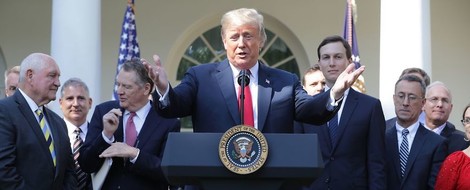Your podcast discovery platform
Curious minds select the most fascinating podcasts from around the world. Discover hand-piqd audio recommendations on your favorite topics.

piqer for: Globalization and politics Global finds
Luis BARRUETO is a journalist from Guatemala. Studied business and finance journalism at Aarhus University in Denmark and City University London.
NAFTA 2.0.: What It Is And What It Means For World Trade
Donald Trump had threatened to dismantle the North America Free Trade Agreement (NAFTA), but instead he has chosen to replace it with a new trade deal re-labelled the United States, Mexico and Canada Agreement (USMCA).
The US and Mexico set aside their differences about a month ago, but the strict deadline — Mexico's incoming President takes office on Dec. 1 — might have helped the US and Canada resolve some of their disagreements.
America wanted to do away with "Chapter 19", a dispute-settling mechanism, gain access to the Canadian dairy market for American producers, and increase the threshold below which products can enter Canada without paying duties. Chapter 19 survived, but the US got the latter two concessions.
Meanwhile, the car industry upended its regional-content requirement for goods to move tariff-free between the USMCA region, effectively shifting in favor of North American part producers — this is the most radical change from NAFTA.
What does this all mean?
In Today, Explained journalist Jen Kirby and geopolitical analyst Ian Bremmer break down the content of the agreement. It is a good rundown if you're not into the weeds of trade policy.
Politically, Trump can say that he did something about NAFTA, and while USMCA doesn't break dramatically from the original text, he can now brag about replacing it.
Two things should make us worry, however. First is that the deal actually undermines investor certainty and makes disputes between the US and Mexico more likely. Cornell Professors Gustavo Flores and Mariano Sánchez explain (NYT).
The other is that the fine print includes a provision that requires any member to notify its partners three months in advance if it launches trade negotiations with a non-market economy. As the US now considers China to be one, this means that the deal can become bilateral if any USMCA party enters into talks with China or a similar economy. This effectively means a loyalty oath is nested into it. (Politico Pro, paywall)
